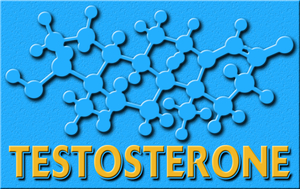In men 45 and older, most cases of hypogonadism or Low-T often go overlooked due to the fact that the symptoms may be more general in nature and slower in onset. Many men simply attribute their symptoms to aging and often dismiss them because they don't think that there is anything that they can do about them. This is largely because the symptoms of hypogonadism are nearly identical to those experienced by men going through andropause (the male menopause): low libido, fatigue, depression, memory loss, difficulty concentrating and irritability. The difference between andropause and hypogonadism is simple. Andropause is a natural part of a man's life where his hormones begin to decline right around the age of 35 and continue to decrease until they plateau in his late 60's. Hypogonadism is a condition where testosterone is not being produced due to a physical abnormality of the testes or brain. It can also be due to an outside factor such as stress, poor diet or pre-existing health conditions. Both Hypogonadism and andropause however can be treated and corrected under the care of experienced hormonal specialists.
There are two basic forms of hypogonadism found in men. Primary hypogonadism is also known as "testicular failure" and stems from a complication in the testicles. Some common causes of primary hypogonadism are:
The other type of hypogonadism is called secondary hypogonadism, and it describes a condition where the testicles are normal on a physiological level, but still don't function properly due to a problem stemming from the pituitary gland or the hypothalamus. This creates a problem with the signal from the brain to the testicle. Although the testicles function well, they can't get the information from the brain that testosterone needs to be produced. Some common causes of secondary hypogonadism are:
The most effective ways to treat hypogonadism are to enhance the body's ability to make its own testosterone or to supplement the testosterone that your body would produce normally, using natural bioidentical testosterone replacement therapy. It is critical to combine bioidentical hormone therapy with appropriate diet, exercise, lifestyle and stress management. Although there are many different causes for the condition, hypogonadism always leads to hormonal imbalance and can lead to a wide range of symptoms and chronic health issues. Fortunately, under the proper care of a highly trained BodyLogicMD affiliated physician, the condition can be corrected.
Through comprehensive testing, your BodyLogicMD affiliated physician will determine your hormone levels to uncover potential hormone deficiencies. Based on cutting edge diagnostic technologies, BodyLogicMD affiliated physicians pinpoint the source of underlying hormonal imbalances and use all natural bioidentical hormone replacement therapy (BHRT) interlaced with customized nutrition and fitness regimens to help men find relief symptoms of hormonal imbalance. BodyLogicMD affiliated physicians have helped thousands of men get their edge back and overcome testosterone deficiencies such as andropause and hypogonadism.
CONTACT A PHYSICIAN
CLICK HERE
HORMONE BALANCE QUIZ Take it now!
Read more here:
BodyLogicMD - Hypogonadism (Low Testosterone in Men)
Contact Us Today For A Free Consultation

- BioSante Pharmaceuticals, Inc. to Present at BIO Investor Forum [Last Updated On: October 24th, 2015] [Originally Added On: October 9th, 2012]
- Secondary osteoporosis: More than what meets the eye! [Last Updated On: January 15th, 2018] [Originally Added On: October 10th, 2012]
- Trimel Provides Clinical and Operational Update [Last Updated On: December 2nd, 2017] [Originally Added On: October 15th, 2012]
- Obese teen boys likelier to become impotent and infertile adults [Last Updated On: December 11th, 2017] [Originally Added On: October 17th, 2012]
- Obese teen boys have up to 50 percent less testosterone than lean boys [Last Updated On: December 27th, 2017] [Originally Added On: October 17th, 2012]
- Trimel Reports Physician Market Research Results for CompleoTRT(TM) [Last Updated On: January 8th, 2018] [Originally Added On: October 24th, 2012]
- Obese teen boys likelier to turn into 'impotent' men [Last Updated On: January 19th, 2018] [Originally Added On: October 24th, 2012]
- Trimel Pharmaceuticals Corporation to Report Third Quarter 2012 Results and Host a Conference Call to Update Investors [Last Updated On: January 2nd, 2018] [Originally Added On: November 2nd, 2012]
- Peer Exchange: Establishing Bone Health Clinics - Video [Last Updated On: November 2nd, 2012] [Originally Added On: November 2nd, 2012]
- What is hypogonadism and how does it affect fertility? - Video [Last Updated On: November 2nd, 2012] [Originally Added On: November 2nd, 2012]
- Low Testosterone in Men or Man-O-Pause - Video [Last Updated On: November 2nd, 2012] [Originally Added On: November 2nd, 2012]
- Propecia (Finasteride) -- Undisclosed Mechanisms, Potential Dangers [Last Updated On: November 2nd, 2012] [Originally Added On: November 2nd, 2012]
- How to Get Ripped - Why You Shouldnt Use Anabolic Steroids - Video [Last Updated On: November 2nd, 2012] [Originally Added On: November 2nd, 2012]
- Future Doc: Andropause Alternatives with Dr. James Biddle Part 1 - Video [Last Updated On: November 2nd, 2012] [Originally Added On: November 2nd, 2012]
- Sector Update: Healthcare - Video [Last Updated On: November 2nd, 2012] [Originally Added On: November 2nd, 2012]
- Increase Testosterone Naturally With these Diet And Workout Secrets - Video [Last Updated On: November 2nd, 2012] [Originally Added On: November 2nd, 2012]
- Signs And Symptoms of Hypogonadism [Last Updated On: December 29th, 2016] [Originally Added On: November 2nd, 2012]
- Auxilium and Pfizer Will Conclude Agreement on XIAPEX® EU Collaboration [Last Updated On: May 4th, 2015] [Originally Added On: November 9th, 2012]
- Repros Therapeutics Inc.(R) Reports Third Quarter 2012 Financial Results [Last Updated On: May 4th, 2015] [Originally Added On: November 14th, 2012]
- hypogonadotropic hypogonadism - Video [Last Updated On: November 22nd, 2012] [Originally Added On: November 22nd, 2012]
- Research and Markets: Male Hypogonadism - Pipeline Review, H2 2012 [Last Updated On: December 7th, 2017] [Originally Added On: November 30th, 2012]
- Auxilium Pharmaceuticals, Inc. to Present At The Oppenheimer 23rd Annual Growth Conference [Last Updated On: May 4th, 2015] [Originally Added On: December 8th, 2012]
- Low Testosterone (Hypogonadism) - Part 2 - Video [Last Updated On: December 10th, 2012] [Originally Added On: December 10th, 2012]
- The National Mesothelioma Law Firm of Baron and Budd Reports on a New Drug that Could Improve the Health of ... [Last Updated On: May 4th, 2015] [Originally Added On: December 19th, 2012]
- Hypogonadism ¦ Treatment and Symptoms - Video [Last Updated On: March 7th, 2013] [Originally Added On: March 7th, 2013]
- Research and Markets: Male Hypogonadism Global Clinical Trials Review, H1, 2013 [Last Updated On: December 28th, 2017] [Originally Added On: May 1st, 2013]
- Male hypogonadism Prof Ossama Fouda - Video [Last Updated On: May 9th, 2013] [Originally Added On: May 9th, 2013]
- Hypogonadism - what should you do - Video [Last Updated On: July 2nd, 2013] [Originally Added On: July 2nd, 2013]
- Low Testosterone (Hypogonadism) - Part 3 - Video [Last Updated On: July 2nd, 2013] [Originally Added On: July 2nd, 2013]
- NURS805 Hypogonadism Lecture - Video [Last Updated On: August 16th, 2013] [Originally Added On: August 16th, 2013]
- Hypogonadism: MedlinePlus Medical Encyclopedia [Last Updated On: December 17th, 2017] [Originally Added On: November 3rd, 2013]
- Hypogonadism - Diseases & Conditions - Medscape Reference [Last Updated On: December 27th, 2017] [Originally Added On: November 10th, 2013]
- Hypogonadotropic hypogonadism - Wikipedia, the free encyclopedia [Last Updated On: January 24th, 2018] [Originally Added On: November 10th, 2013]
- Low Testosterone (Low-T) Normal Levels, Hypogonadism, Symptoms ... [Last Updated On: January 1st, 2018] [Originally Added On: November 15th, 2013]
- HYPOGONADISM - University of Dundee [Last Updated On: May 4th, 2015] [Originally Added On: November 23rd, 2013]
- FAQ - Hypogonadism - MEDICAL DIAGNOSIS AND MEDICINAL PLANTS [Last Updated On: January 27th, 2018] [Originally Added On: November 23rd, 2013]
- Hypogonadism - About.com Men's Health [Last Updated On: December 12th, 2017] [Originally Added On: December 2nd, 2013]
- Exciting medical advances using HRT [Last Updated On: May 4th, 2015] [Originally Added On: December 12th, 2013]
- Male hypogonadism: Symptoms - MayoClinic.com [Last Updated On: March 28th, 2020] [Originally Added On: December 12th, 2013]
- Audio-Digest Foundation Announces the Release of Oncology Volume 04, Issue 16: Highlights from Future Directions ... [Last Updated On: December 15th, 2013] [Originally Added On: December 15th, 2013]
- Hypogonadism - Medscape Reference [Last Updated On: January 29th, 2018] [Originally Added On: December 21st, 2013]
- Hypogonadism [Last Updated On: January 12th, 2018] [Originally Added On: December 23rd, 2013]
- Hypogonadism - HealthCentral [Last Updated On: December 14th, 2017] [Originally Added On: December 24th, 2013]
- Hypogonadism | Medscape - Latest Medical News, Clinical Trials ... [Last Updated On: December 18th, 2017] [Originally Added On: December 30th, 2013]
- Hypogonadism - SharedJourney [Last Updated On: December 19th, 2017] [Originally Added On: January 23rd, 2014]
- Study Finds Potential Heart Risks from Testosterone Therapy [Last Updated On: November 24th, 2020] [Originally Added On: February 3rd, 2014]
- Endocrine Society calls for large-scale studies to evaluate testosterone therapy risks [Last Updated On: November 18th, 2020] [Originally Added On: February 8th, 2014]
- Testosterone Therapy Not Always Good for Older Men [Last Updated On: October 3rd, 2020] [Originally Added On: February 11th, 2014]
- Hypogonadism: Types, Causes, & Symptoms Healthline [Last Updated On: December 5th, 2017] [Originally Added On: February 14th, 2014]
- Low Testosterone (Hypogonadism) in Men - Video [Last Updated On: November 7th, 2020] [Originally Added On: February 14th, 2014]
- Hypogonadism : Types, Causes, & Symptoms - Healthline [Last Updated On: January 28th, 2018] [Originally Added On: February 17th, 2014]
- Hypogonadism | Medscape - Latest Medical News, Clinical ... [Last Updated On: October 6th, 2020] [Originally Added On: February 23rd, 2014]
- Endo: FDA Oks AVEED Injection For Treatment Of Adult Men With Hypogonadism [Last Updated On: November 3rd, 2020] [Originally Added On: March 6th, 2014]
- Unit Project 1 Hypogonadotropic hypogonadism - Video [Last Updated On: November 26th, 2020] [Originally Added On: March 8th, 2014]
- Update on Endo's Product Portfolio - Analyst Blog [Last Updated On: October 17th, 2020] [Originally Added On: March 11th, 2014]
- Male hypogonadism Symptoms - Diseases and Conditions ... [Last Updated On: October 20th, 2020] [Originally Added On: April 2nd, 2014]
- Hypogonadism: Types, Causes, & Symptoms - Medical ... [Last Updated On: November 11th, 2020] [Originally Added On: April 6th, 2014]
- VLog #127 Frances Explains Hypogonadism. - Video [Last Updated On: November 4th, 2020] [Originally Added On: April 7th, 2014]
- Repros Completes Enrollment for Androxal Study - Analyst Blog [Last Updated On: October 27th, 2020] [Originally Added On: April 16th, 2014]
- Prevalence, Diagnosis and Treatment of Hypogonadism in ... [Last Updated On: April 30th, 2014] [Originally Added On: April 30th, 2014]
- Repros Therapeutics Q2 Loss a Penny Wider than Expected - Analyst Blog [Last Updated On: October 3rd, 2020] [Originally Added On: August 12th, 2014]
- Repros Reports Encouraging Late-Stage Data on Androxal - Analyst Blog [Last Updated On: October 5th, 2020] [Originally Added On: August 28th, 2014]
- Repros Therapeutics Analyst Brief Report; Androxal(R) Achieves Superiority in Top Line Analysis by Small Cap Street ... [Last Updated On: October 31st, 2020] [Originally Added On: September 30th, 2014]
- The Wall Street Journal: Repros Therapeutics shares drop on drug application setback [Last Updated On: October 22nd, 2020] [Originally Added On: October 18th, 2014]
- Apricus expands development pipeline with in-licensing of US rights for fispemifene [Last Updated On: November 21st, 2020] [Originally Added On: October 21st, 2014]
- Apricus expands development pipeline with the in-licensing of US rights for fispemifene, a phase 2b ready asset, from ... [Last Updated On: November 20th, 2020] [Originally Added On: October 21st, 2014]
- Hypogonadism No Moustache! No Beard!! [Last Updated On: November 20th, 2020] [Originally Added On: October 28th, 2014]
- Male Hypogonadism: Male Reproductive Endocrinology: Merck ... [Last Updated On: December 24th, 2017] [Originally Added On: October 28th, 2014]
- Hypogonadism Wikipedia [Last Updated On: November 10th, 2020] [Originally Added On: October 28th, 2014]
- Urology Care Foundation - Urology A-Z - Low Testosterone [Last Updated On: June 19th, 2015] [Originally Added On: November 3rd, 2014]
- Will Repros (RPRX) Miss Estimates This Earnings Season? - Analyst Blog [Last Updated On: October 11th, 2020] [Originally Added On: November 5th, 2014]
- Hypogonadism in men living with HIV - Video [Last Updated On: November 22nd, 2020] [Originally Added On: November 7th, 2014]
- Male Hypogonadism Therapeutic Pipeline Industry Review, H2 2014 - Video [Last Updated On: November 14th, 2020] [Originally Added On: November 7th, 2014]
- Testosterone Deficiency (Hypogonadism) Overview ... [Last Updated On: November 23rd, 2014] [Originally Added On: November 23rd, 2014]
- Endo to Acquire Rights to Testosterone Nasal Gel Natesto - Analyst Blog [Last Updated On: November 12th, 2020] [Originally Added On: November 26th, 2014]
- Male hypogonadism pathophysiology - Video [Last Updated On: October 31st, 2020] [Originally Added On: January 14th, 2015]
- Auxilium Announces Results from Special Meeting of Stockholders [Last Updated On: May 4th, 2015] [Originally Added On: January 28th, 2015]
- What is Hypogonadism - Symptoms and Treatment | Hormone ... [Last Updated On: January 5th, 2018] [Originally Added On: January 30th, 2015]
- Male Hypogonadism 1/28/15 - Video [Last Updated On: November 1st, 2020] [Originally Added On: January 31st, 2015]
- Male hypogonadism: symptoms, cause, treatment, risk ... [Last Updated On: November 12th, 2020] [Originally Added On: February 18th, 2015]
Word Count: 490





















